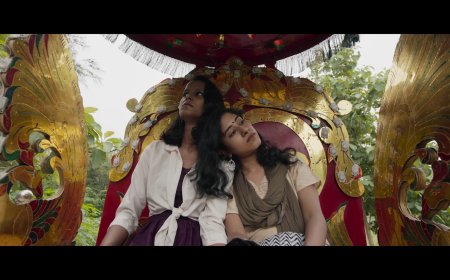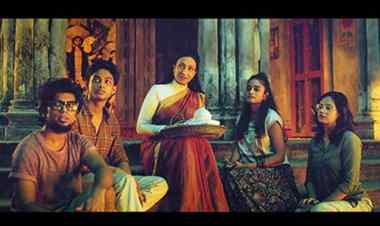ANUR – A MOVING FILM BY MONJUL BARUAH
Noted film scholar, (Dr.) Shoma A. Chatterji, is in conversation with filmmaker Monjul Baruah. “Making a film has always been a form of meditation for me” – Monjul Baruah

Monjul Baruah is a strapping young director who has just made a beautiful feature film called Anur (Eyes on the Sunshine) recently. The film is adapted on a story authored by Anuradha Sarma Pujari, winner of the Sahitya Akademi Award. The original name of the story is“Bhal Puwar Xomoi”.This is Monjul’s third feature film. Before Anur, he made two feature films, Antareen (2015) and Kaaneen (2018). Antareen is a women-focused drama written by Sahitya Akademi Award recipient author, Dr. Rita Chowdhury and produced by Manabendra Adhikary. Tarali's life is a journey for sanctuary from her father's loveless environment, but her desire to unearth her father's wrongdoing lands her in a mental asylum. Samiran joins her struggle against patriarchy in that trap.Kaaneen, which won the Silver Camera Award at the 2nd Guwahati International Film Festival 2018, and was screened at the Bangla Axomiya Film Festival 2018, New Delhi, and the 4th Northeast Film Festival, Pune 2019, is written by Rita Chowdhury. The film is about Mandira, the housewife of a high-ranking police officer. She finds an abandoned newborn infant on the side of the road and takes the infant to the hospital. But it takes her back to her own baby from a premarital affair.
In an in-depth interview, Baruah opens up on his new film Anur.
Your background before you stepped into films and why?
MB: I was born into a family where filmmaking has always been a practice. Intriguingly, I was in my mother's womb when my uncle, National Award-winning filmmaker Jahnu Barua, was shooting his debut Feature, Aparoopa (1981), in which my father played the role of a doctor on a tea estate. Interestingly, my uncle, Jahnu Barua, exposed me to the world of film. In 1995, I had passed my matriculation examination, and my uncle was shooting the film Kukhal, where I was only allowed to work as a production assistant. That was my humble introduction to the world of filmmaking, and the path continues to this day.
Is ANUR your debut film? If it is not, what films have you worked on before this film?
MB: Anur is my third feature film. Earlier, I made two feature films, Antareen (2015) and Kaaneen (2018). Antareen is a women-focused drama written by Sahitya Akademi Award recipient author, Dr. Rita Chowdhury and produced by Manabendra Adhikary. Tarali's life is a journey for sanctuary from her father's loveless environment, but her desire to unearth her father's wrongdoing lands her in a mental asylum. Samiran joins her struggle against patriarchy in that trap. Kaaneen, which won the Silver Camera Award at the 2nd Guwahati International Film Festival 2018, and was screened at the Bangla Axomiya Film Festival 2018, New Delhi, and the 4th Northeast Film Festival, Pune 2019, is written by Rita Chowdhury. The film is about Mandira, the housewife of a high-ranking police officer. She finds an abandoned newborn infant on the side of the road and takes the infant to the hospital. But it takes her back to her own baby from a premarital affair. Suddenly, she gets frantic to retrieve back her abandoned child, whose whereabouts or destiny she doesn't know. Though her high social status hinders her search for her child, but she goes against all odds and finds him in his humble shanty. She discovers her grown son living with an elderly widow who worked at an orphanage and whom her son calls mother. Mandira wants her son back, but her conscience keeps screaming about earlier sin and eventually, she could not bring him back due to the present family that has her husband, her son and daughter.
ANUR is said to be based on a novel. Is this true? If yes, which novel and who is the author?
MB: Yes, the film is based on the short story "Bhal Puwar Xomoi" by Anuradha Sharma Pujari, winner of the Sahitya Akademi Award.
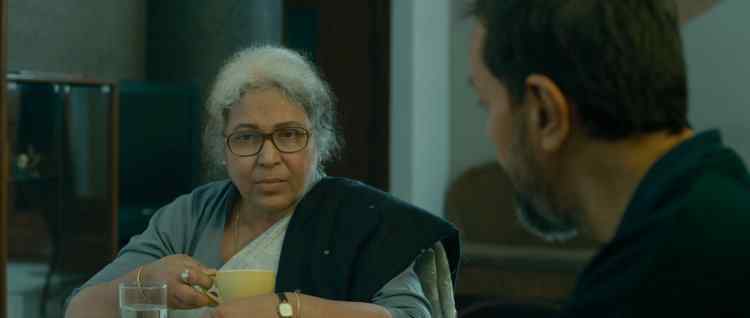
Film still: Anur
The entire film is about a relationship between an old woman and a middle-aged man who have left their former lives behind and moved ahead. What attracted you to the story as it is not expected to be very audience-friendly?
MB: In 2018, while my father was ill with cancer, he asked me, "What will happen to your mother?" He was aware of his impending demise. He was worried about my mother in his absence which would make her lonely. I am the only child of my parents, and I reside in Guwahati, approximately 400 kilometers from our home. I assured my father I would return home and would not leave her feel lonely. When he heard my words, my father was delighted. After my father's passing way in August 2018, I returned home. This story was sent to me by Dr. Jahanara Begum baideu (elder sister), who played the lead roles as Mandira and Anupama in Kaaneen and Anur, respectively. I could connect the story to my own suffering as I read it. I tried to illustrate through the film why I think this narrative is important in the context of our current societal pattern. Besides, from what I've seen, there are hardly any films in India that address the topic of old age love or ageing. When we screened the film in Guwahati, the audience's reactions were incredibly motivating.
Your directorial statement on this film.
MB: The story is about a widow who finds herself captive in a claustrophobic loneliness in the house built by her late husband even though she gets regular calls from her son who lives abroad, and a maid comes regularly to help her with domestic chores. She has a trusted young man at her beck and call on whom she depends for her other household matters. But the silence of loneliness at the core of her being is broken by a widower whom she initially saw as a suspicious, unwelcome intruder. As the story proceeds, we see him, or rather she sees him as an embodiment of the world she wants to escape into. Whether she breaks free from her captivity is not what the story is concerned about, it is about the stark contrast between the situation of the widow and the world she badly wants to escape
Why did you choose Rajat Kapoor instead of selecting an Assamese actor for the role?
MB: In most cases, we only consider our closest relatives and friends to be true friends. However, there are times when people we don't know come into our lives and support us, and these "strangers" become our "close" despite the limitations that other circumstances may impose. The film explores how strangers from all walks of life (caste, creed, and faith) may overcome their isolation and grow close to one another. Above all, humanity is the foundation that adds meaning to our life. I would like to thank Rajat Kapoor, Sir, for accepting the part of Mudliar after reading the script.
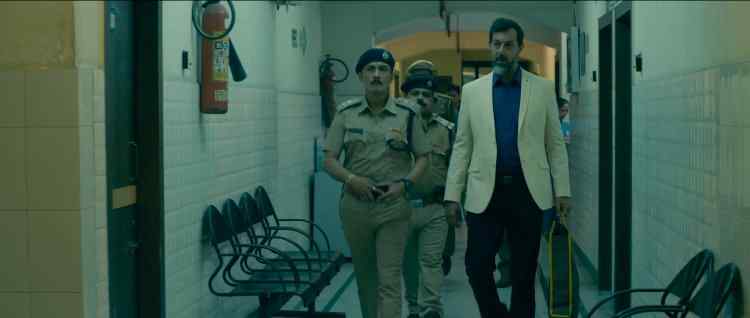
Film still: Anur
How did you decide on the casting?
MB: We had a casting director, Ronald Hussain, who did an outstanding job of locating the ideal actors. Besides, I have great faith in Dr. Jahanara Begum who plays the protagonist who has done a brilliant job.
Where exactly did you shoot the film and how long did it take from conception to the censor certificate?
MB: The city of Guwahati serves as the setting for the events that take place in the film; therefore, we shot the entire film there. We began with the concept in November of 2019 and received the censorship certificate on December 30, 2021. That makes it two years.
What brief did you give to the music director?
MB: Tarali Sarma, a National Award-Winning Music Director, composed the soundtracks for all three of my films. We have a creative rapport, so I did not need to brief her, but I did show her the film so she could comprehend its tone. She also has a firm grasp on what I find appealing.
The names of the festivals the film has been selected for screening till now.
MB: The film has been selected at the competition section at the 27th edition of the International Film Festival of Kerala (IFFK) and in the ‘Cinema of the World’ section at the 21st edition of the Dhaka International Film Festival.
Which filmmakers, Indian and International, do you look up on as ideals in your journey as a filmmaker?
MB: Satyajit Ray, Shyam Benegal, Jahnu Barua, and Iranian filmmaker Majid Majidi are just a few of the filmmakers that have inspired me.
How do you direct? (a) script reading sessions? (b) rehearsals, (c) workshops, (d) improvisations choice for the actors, (e) a combination of all these? (f) depends on the actor?
MB: Making a film has always been a form of meditation for me, and I immerse myself fully when working. During the shoot, I don't want any mistakes to be overlooked. I thus do script readings with the performers, followed by rehearsals and workshops. Yes, there are times when I need to improvise depending on the actors in the scene.
Anything else you may want to add?
MB: At the screening at Guwahati, my uncle Jahnu Barua commented, “ It was a landmark film in Assamese cinema," which bolstered my pride in the film. I am sure that this film will offer the audience a new experience.
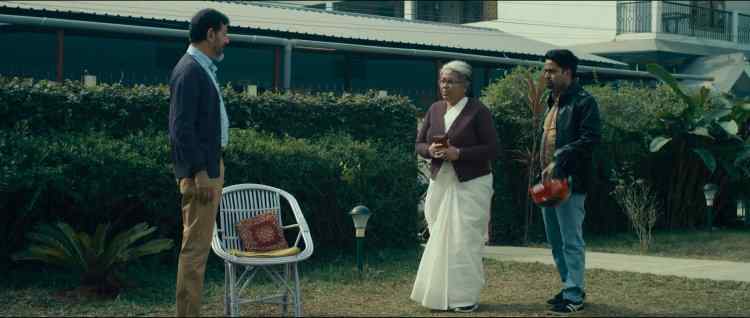
Film still: Anur
**
About the author: Dr. Shoma A. Chatterji is an Indian film scholar and author based in Kolkata.
What's Your Reaction?





















































